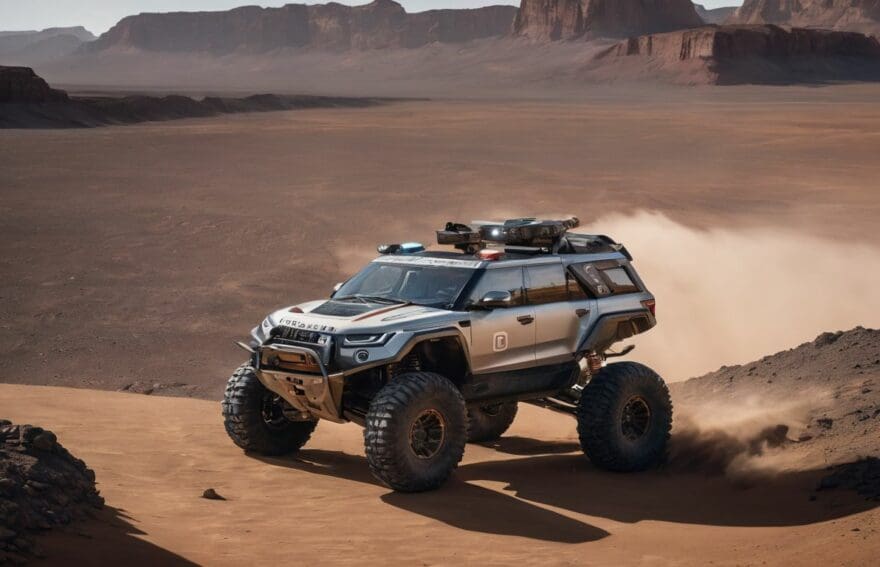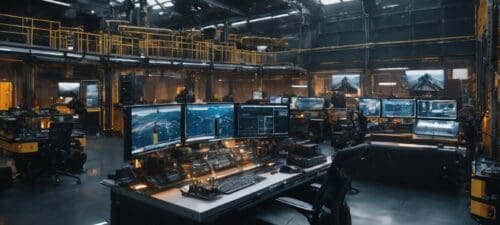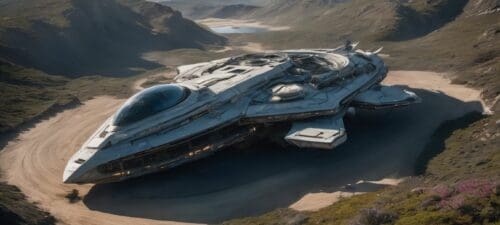Surviving Mars: Colonizing the Red Planet Against All Odds

Updated On: October 30, 2025 by 
The prospect of venturing forth into the cosmos and laying down roots on Mars has long been a tantalising dream for many, us included. We’ve found ourselves musing over the possibility of withstanding the formidable Martian climes – is it truly within our reach as a species? Our investigations have unearthed fascinating findings: merely 22 intrepid individuals might well ignite the flame of civilisation on this red expanse.
In our blog post, we illuminate how humanity could prosper amid the unforgiving weather and limited resources of Mars. By providing thoughtful reflections and viable approaches to enduring sustainably, we invite you to join us in this exploration.
So don your space helmet, dear reader – together, let’s traverse ‘Surviving Mars’ with curiosity and gusto!
Challenges of Colonising Mars
The dangerous Martian atmosphere and limited resources present constant threats to survival on the Red Planet. Overcoming these challenges requires a strategic and innovative approach to colonisation.
Dangerous Martian atmosphere
Venturing onto the Martian surface comes with a myriad of risks, and the dangerous atmosphere is one of the most treacherous obstacles we face. Mars’s air, primarily carbon dioxide with traces of nitrogen and argon, lacks oxygen, creating an environment hostile to human life.
Prolonged exposure to this atmosphere without proper equipment can lead to suffocation or decompression sickness.
To ensure our survival in “Surviving Mars”, we’ve got to constantly manage life support systems that provide breathable air. Dust storms are frequent on the Red Planet; these can damage our equipment and reduce visibility, complicating every outside activity.
It’s critical that every colonist stays alert and ready to tackle these challenges at any moment if we hope to build a successful colony against all odds.
Limited resources
With the treacherous Martian atmosphere posing a constant threat, the availability of limited resources on the Red Planet adds to the complexity of colonising Mars. In this harsh environment, essential supplies such as water, oxygen, and building materials must be carefully managed to ensure survival.
The scarcity of these resources presents a significant challenge in establishing sustainable human settlements. Players navigating through “Surviving Mars” can experience firsthand the demanding task of managing scarce resources while striving to build and maintain a thriving colony amidst the unforgiving Martian landscape.
Constant threats to survival
Surviving Mars presents constant threats to survival. The Martian atmosphere is dangerous, making it crucial to build adequate life support systems. Limited resources pose a challenge, as players must carefully manage water, oxygen, and food supplies. Natural disasters such as meteor showers and dust storms can disrupt the colony’s operations and endanger the colonists’ lives. The harsh environment requires constant vigilance to protect against radiation exposure and ensure the well-being of the entire colony. Maintaining a sustainable and thriving human settlement on Mars demands careful planning and strategic resource management.
The Role of Drones in Mars Colonisation
Drones play a crucial role in the initial stages of Mars colonisation, helping to gather resources and construct necessary infrastructure. However, their usage also comes with its challenges and limitations that need to be carefully navigated.
https://www.youtube.com/watch?v=8HxtirKbIBk
Importance of drones in initial stages
Drones play a crucial role in the initial stages of colonising Mars, aiding in vital tasks such as scouting for suitable landing sites and assessing potential resources. They are instrumental in gathering essential data about the Martian surface, helping to plan and strategise the construction of infrastructure before human arrival.
With their ability to navigate harsh terrains and collect valuable information, drones are indispensable tools for laying the groundwork for successful human settlement on the Red Planet.
Utilising drones enables us to overcome challenges posed by limited resources and hazardous conditions on Mars by providing real-time insights into potential risks and opportunities.
Utilising drones for resource gathering and construction
After understanding the importance of drones in the initial stages of Mars colonisation, it becomes essential to grasp their role in resource gathering and construction. Drones play a pivotal role in sourcing vital resources such as metals and rare minerals from the Martian terrain, which are crucial for constructing and maintaining the colony’s infrastructure. They are equipped with advanced scanning capabilities to identify suitable resource deposits with precision, maximising resource extraction efficiency. Additionally, drones can transport and deposit these resources at designated construction sites, facilitating the building process and alleviating manual labour demands.
- Drones enable swift exploration and identification of resource – rich areas, accelerating the establishment of essential structures for sustaining human life on Mars.
- Advanced drone technology allows for efficient utilisation of available resources by transporting raw materials to construction sites, supporting ongoing expansion efforts.
- The flexibility and adaptability of drones make them indispensable in navigating challenging terrains and collecting resources from hard-to-reach locations, ensuring a steady supply chain for colony development.
- With their autonomous operation capabilities, drones can operate continuously without human intervention, ensuring round-the-clock surveillance and resource acquisition to meet the colony’s growing needs.
Challenges and limitations of drone usage
Deploying drones on Mars presents several challenges and limitations. The harsh Martian atmosphere, characterised by thin air and dust storms, poses obstacles to drone navigation and flight stability.
Limited resources also constrain the capabilities of drones for sustained operation on the Red Planet. Moreover, the constant threats to survival further impede optimal drone usage, as these aerial vehicles are susceptible to damage from extreme conditions and unexpected hazards.
Despite their potential benefits, these challenges highlight the need for innovative solutions to maximise the effectiveness of drones in supporting human colonies on Mars.
To overcome these limitations, advancements in drone technology are essential for navigating the dangerous Martian atmosphere with improved precision and resilience. Additionally, strategies for efficient resource management must be developed to extend operational capabilities while minimising reliance on scarce resources.
Human Settlement on Mars
Establishing a successful human settlement on Mars requires careful planning, consideration of the effects of low gravity on human health, and strategies for maintaining a healthy and happy colony.
To learn more about this exciting frontier of space colonisation, read our blog!
Requirements for successful human settlement
To establish a successful human settlement on Mars, we must prioritise the key elements that sustain life. Adequate shelter capable of protecting against harsh Martian atmosphere, reliable sources of water and food to meet basic needs, and sustainable energy solutions are essential for survival.
Maintaining psychological well-being is crucial for a happy colony; therefore, creating recreational spaces and fostering community connections are vital. Additionally, medical facilities equipped to address health challenges stemming from low gravity must be incorporated into the settlement’s infrastructure.
Furthermore, embracing adaptability in technology and innovation is paramount for overcoming unexpected obstacles that may arise on the Red Planet. Developing strategies to mitigate the long-term effects of low gravity on human health is also imperative as it poses significant risks to colonists’ well-being.
Effects of low gravity on human health
Transitioning from the necessities of successful human settlement on Mars, it’s imperative to acknowledge the effects of low gravity on human health. The significant impact of prolonged exposure to low gravity cannot be overlooked when considering the sustainability and well-being of a Martian colony.
In such conditions, bone density decreases, muscle mass diminishes, and cardiovascular function is impaired due to reduced physical exertion. These changes pose serious health risks for colonists on Mars; thus, strategies must be devised to mitigate these adverse effects through tailored exercise regimens and dietary plans.
Furthermore, extended periods in low gravity can also affect the immune system, leading to an increased susceptibility to infections and diseases. Colonists would need advanced medical facilities capable of addressing these specific health challenges and maintaining overall well-being in an environment where gravitational forces are different from those on Earth.
Strategies for maintaining a healthy and happy colony
To maintain a healthy and happy colony on Mars, we must prioritise the well-being of our inhabitants. Here are some strategies to achieve this:
- Implementing regular physical exercise and fitness programmes to combat the effects of low gravity on human health, ensuring overall well-being and strength.
- Providing mental health support and community activities to foster a sense of belonging and connection within the colony, promoting psychological resilience.
- Establishing sustainable food production methods and diverse dietary options to sustain a healthy diet for individuals within the colony, supporting their physical health.
- Creating recreational spaces and entertainment facilities to alleviate stress and promote social interaction, contributing to a positive atmosphere in the colony.
- Offering educational opportunities and skill development programmes for continuous personal growth, enhancing the overall satisfaction and fulfilment of the inhabitants.
- Implementing efficient waste management systems and environmental sustainability initiatives to promote a clean and healthy living environment for all colony members.
The Importance of Planetary Anomalies
Exploring and interacting with planetary anomalies on Mars presents unique opportunities and challenges for colonists. From potential benefits to the risks involved, understanding the role of anomalies is crucial for surviving and thriving on the Red Planet.
Unique opportunities and challenges presented by anomalies
Planetary anomalies on Mars offer unique opportunities and challenges for colonists. These anomalies could hold the key to scientific discoveries, providing valuable insights into the Red Planet’s geology, history, and potential for sustaining life.
However, interacting with anomalies carries inherent risks as they may pose unanticipated threats to human survival. Careful study and management of these anomalies are essential for successful colonisation efforts.
Exploring Martian anomalies presents exciting prospects for uncovering hidden resources and unlocking new technologies that could aid in the development of sustainable colonies. On the other hand, mishandling or underestimating these anomalies might lead to catastrophic consequences that could jeopardise the entire mission.
Potential benefits of studying and interacting with anomalies
Exploring anomalies on Mars can reveal valuable scientific insights. Discovering unexpected phenomena can lead to breakthroughs in understanding the planet’s geology, climate, and potential for sustaining life.
Interacting with anomalies may also offer opportunities for resource acquisition, making them essential to the success of a Martian colony. Furthermore, studying anomalies could provide crucial information for terraforming efforts and enhancing the overall survival strategy.
By investigating anomalies, players can gain new knowledge about surviving on Mars and improve their colonisation strategies. Additionally, harnessing these findings from encounters with anomalies will be vital in advancing research and technology for future human settlements on Mars.
The risk involved in dealing with anomalies
Dealing with anomalies on Mars entails significant risks, as unknown and unpredictable factors can pose threats to the human settlement. These anomalies may introduce unexpected challenges, potentially disrupting crucial systems vital for survival.
Managing these anomalies requires careful consideration and strategic planning to mitigate potential dangers. Despite the inherent risks, studying and interacting with anomalies presents unique opportunities for scientific discovery and progress in understanding the Martian environment.
As we navigate the complexities of surviving on Mars, our approach to handling anomalies will play a pivotal role in ensuring the safety and sustainability of our colony. Understanding the potential risks associated with anomalies is essential for devising effective strategies that safeguard our mission’s success.
The Role of Expeditions in Surviving Mars
Expeditions play a crucial role in the survival of Mars colonies, allowing us to undertake missions from the Planet View, gather valuable resources and rewards, and ultimately build a sustainable colony.
These expeditions are essential for our success in overcoming the challenges of colonising the Red Planet against all odds.
Undertaking expeditions from the Planet View
Payloads and rewards for completed expeditions
Undertaking expeditions from the Planet View allows us to uncover valuable payloads and rewards for completed expeditions. Here’s a breakdown of the exciting rewards that await successful Martian explorers:
- Unearthing rare resources like valuable metals and minerals that are essential for sustaining the colony
- Discovering new technologies and blueprints which can significantly advance our capabilities on Mars
- Obtaining funding and support from Earth as a result of successful discoveries
- Gaining scientific insights and knowledge about the Red Planet’s unique environment and potential for habitation
Building a sustainable colony through expeditions
To build a sustainable colony on Mars, we must send out expeditions from the Planet View. These missions are crucial for collecting valuable resources like metals, concrete, and water. Additionally, they help in discovering new technologies and research opportunities to advance the colony.
- Each expedition undertaken from the Planet View allows us to bring back essential payloads that contribute to the growth and development of our Martian settlement. These payloads may include valuable resources, new technologies, or even rare discoveries that can benefit the colony.
- Successfully completed expeditions offer rewards such as advanced technologies and additional funding, which are vital for overcoming the challenges of building a sustainable colony on Mars.
- Through strategic planning and careful consideration of available resources, expeditions play a significant role in enhancing the resilience and productivity of our Martian settlement.
- As we venture into uncharted territories through expeditions, we have the opportunity to uncover hidden anomalies and unique phenomena that may provide invaluable insights for sustaining life on Mars.
- The successful execution of expeditions aids in expanding our knowledge base and unlocking new opportunities for growth and progress within our burgeoning Martian community.
- By embarking on expeditions, we can establish connections with neighbouring colonies or Earth-based sponsors, fostering partnerships that can further support the long-term sustainability of our Red Planet settlement.
- Utilising the findings from these missions enables us to overcome obstacles and make informed decisions when addressing crucial aspects of survival and progression on Mars.
- Each expedition offers a chance to explore diverse terrains and unlock potential areas for future expansion or resource acquisition, laying the groundwork for sustained growth and prosperity on the Red Planet.
- The continuous pursuit of expeditions is integral to not only surviving but thriving on Mars by securing essential resources, expanding infrastructure, and advancing scientific knowledge in our quest for planetary survival.
Conclusion: Overcoming the Odds in Surviving Mars
Successfully colonising Mars is a monumental challenge due to the hazardous Martian atmosphere, limited resources, and constant threats to survival. Drones play a crucial role in the early stages of colonisation by aiding in resource gathering and construction.
Human settlement on Mars necessitates careful consideration of low gravity’s impact on health and strategies for maintaining a sustainable colony. Planetary anomalies offer unique opportunities for studying and interaction but also pose risks.
Expeditions from the Planet View contribute to building a sustainable colony through payload rewards and exploration experiences. Surviving Mars: Colonising the Red Planet Against All Odds requires strategic thinking, resilience, and adaptability.
FAQs
1. What is ‘Surviving Mars: Colonising the Red Planet Against All Odds’ about?
‘Surviving Mars: Colonising the Red Planet Against All Odds’ is a thrilling concept that involves space exploration and setting up a colony on Mars to survive in an extraterrestrial environment.
2. Can we really live on Mars, or is it just in games set on Mars?
Whilst living on Mars might currently exist mostly in games and imagination, scientists are actively researching Mars exploration and interplanetary living to make space colonisation possible one day.
3. How difficult would it be to survive on an alien planet like Mars?
Survival on an alien planet like Mars presents numerous challenges due to its harsh environment leading to anxious bursts among colonisers, but ongoing research aims at increasing a future mission’s success.
4. Is there any successful mission for Martian colonisation yet?
No successful mission for full-scale Martian colonisation has taken place yet; however, missions for space exploration are continuously revealing more about the final frontier and how humans could possibly adapt to extraterrestrial habitation.









